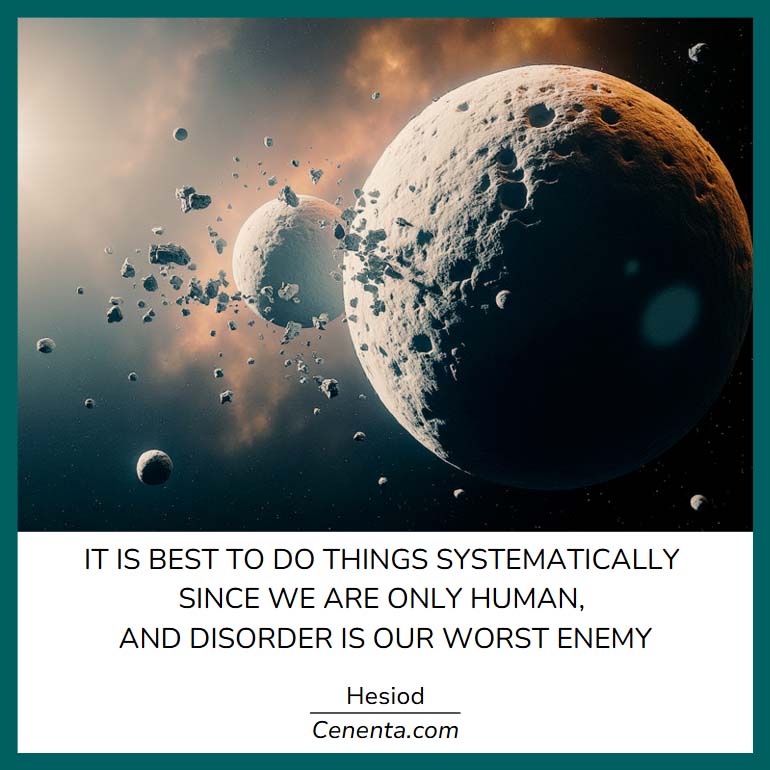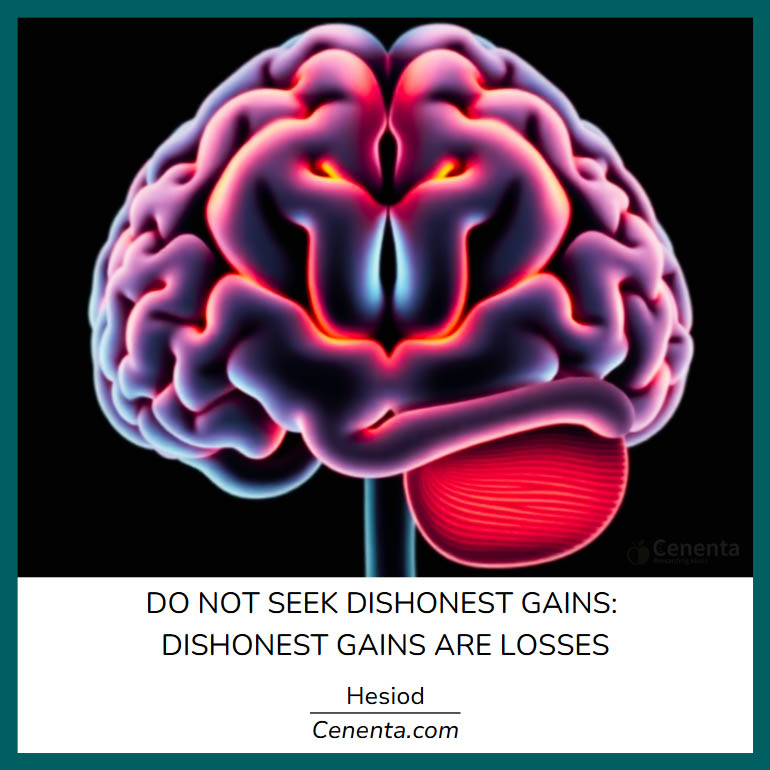The Wisdom of Hesiod: How Ancient Insights Align with Modern Brain ScienceIn a world that often feels dominated by fleeting trends and instant gratification, the wisdom of ancient philosophers like Hesiod stands in stark contrast. His quotes, steeped in the ethos of hard work, virtue, and truth, resonate deeply with findings from contemporary neuroscience. Let’s explore how these timeless insights can guide us in reshaping our minds and lives.
Fact 1: “Your brain processes information through systematic patterns”

Research shows our brains naturally organize information into knowledge structures or schemas, allowing efficient processing and preventing cognitive overload(1). This systematic organization helps us understand and adapt to our world more effectively.
“It is best to do things systematically, since we are only human, and disorder is our worst enemy”
Hesiod
Hesiod’s call for organization resonates with neuroscience, which indicates that structured environments can reduce cognitive load by up to 25%. Our brains process information more efficiently in orderly settings, allowing us to focus on what truly matters. By creating systems and routines, we can enhance our productivity and mental clarity.

Fact 2: “The brain builds knowledge gradually through schemas”

The Nature study confirms that our brains form knowledge structures that integrate new information with existing knowledge(2). This process moves from specific memories to broader understanding.
“Keep adding little by little and it will become a big heap.”
Hesiod
Hesiod encourages us to appreciate the power of incremental progress. Our brains can store unlimited information, and every small effort contributes to a larger goal. This principle is crucial in learning and personal development. By breaking down our goals into manageable tasks, we can create a “big heap” of knowledge and skills over time.

Fact 3: “Your brain has vast storage capacity”

Research shows the brain can store approximately 2.5 million gigabytes of data through its network of 100 billion neurons(3).
“That man is best who sees the truth himself”
Hesiod
In a world overflowing with information, the ability to discern truth is more valuable than ever. Remarkably, our brains are capable of storing about 2.5 million gigabytes of data. This vast capacity emphasizes the importance of critical thinking and self-discovery. By actively engaging with information and reflecting on our experiences, we can cultivate a clearer understanding of the truth, leading to more informed decisions and actions.

Fact 4: “Unfairness activates pain centers”

Neuroscience research demonstrates that witnessing unfairness triggers the same brain regions as physical pain(4).
“It is a hard thing for a man to be righteous if the unrighteous man is to have the greater right.”
Hesiod
Witnessing injustice can evoke profound emotional responses, as our brains are wired to feel distress at moral violations. This response is similar to experiencing physical pain, highlighting the deep connection between our moral compass and our emotional well-being. Hesiod’s insight prompts us to consider the ethical implications of our actions and the importance of standing up for what is right.
Fact 5: “Neuroplasticity enables continuous adaptation”
The brain’s ability to rewire itself through growth and reorganization is proven through research on neural networks(5).
“Between us and virtue the immortals have put what will make us sweat”
Hesiod
Fact 6: “Mental effort creates lasting changes”
Studies show that consistent mental challenges promote neuroplasticity, creating new neural connections(6).
“Men must sweat to attain virtue.”
Hesiod
Hesiod’s assertion that virtue requires effort aligns perfectly with modern neuroscience, which reveals that physical and mental effort can literally reshape our brains. Engaging in hard work rewires our neural pathways, enhancing our decision-making capabilities. Studies show that consistent mental effort can lead to measurable increases in gray matter in areas associated with learning and decision-making. In essence, the more we challenge ourselves, the more robust our brain becomes.

This wisdom encourages us to embrace the grind, knowing that each drop of sweat contributes to our moral and intellectual development.
“Toil is no source of shame; idleness is shame”
Hesiod
In our fast-paced society, the value of hard work can sometimes be overshadowed by the allure of leisure. Yet, focused work has been shown to increase cognitive function by 20%. Engaging in regular mental challenges not only enhances brain performance but also fosters resilience.

Learning through struggle creates stronger neural pathways, leading to more durable memories and skills. Hesiod’s wisdom reminds us that our toil is a vital part of our growth.

Fact 7: “Dishonesty changes brain structure”
Research shows repeated dishonesty reduces activity in the amygdala, making future dishonesty easier.(7)
“Do not seek dishonest gains: dishonest gains are losses”
Hesiod
Finally, Hesiod warns against dishonesty, a sentiment echoed by neuroscience. Engaging in deceit can shrink the amygdala, making future dishonesty easier and dulling our sensitivity to the negative emotions associated with lying. This highlights the long-term consequences of dishonesty, underscoring the importance of integrity in both our personal and professional lives.

Conclusion
The ancient wisdom of Hesiod is not just a relic of the past; it offers profound insights that align with modern brain science. By embracing hard work, seeking truth, and cultivating integrity, we can harness the power of our minds to lead fulfilling and virtuous lives. As we navigate the complexities of the modern world, let us remember that the path to personal growth and moral clarity is paved with effort, reflection, and a commitment to truth.

Citations:
1 PMC6502424
2 Nature/s41539-020-0064-y
3 irisreading.com/brain-memory-limit
4 Frontiers in Psychology
5 Wikipedia/Neuroplasticity
The-Scientist/lying-repetitively-linked-to-decreased-amygdala-activity
